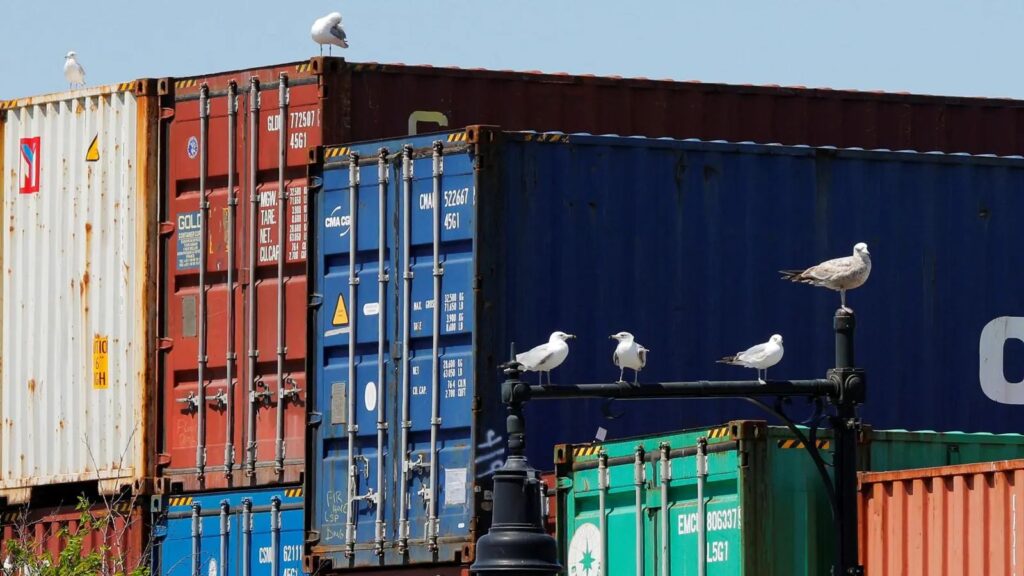Tripura is yet to feel the pinch of India’s import restrictions on neighbouring Bangladesh, as items such as fish, LPG, edible oil, and crushed stone do not fall under the purview of the curbs.
Traders who deal in Bangladeshi imported items, like stone chips, food products, or fish, said that there is no shortage of any item as of now.
India on Saturday placed restrictions on Bangladeshi products being exported to North-East India and overseas, in a reciprocal move given that Dhaka had been imposing non-tariff barriers on Indian exports to Bangladesh.
A local departmental store owner said that different Bangladeshi food products – toast biscuits, packeted puffed rice, including other FMCG items, mainly those produced by Pran Group, are in stock with the local distributors.
The Pran Group has a production factory at Bodhjungnagar industrial estate in West Tripura district, the place where the state government provided land and other facilities to different industrial units, as part of efforts to boost investments in the state.
The store-owner said that most of his customers questioned why they would procure Bangladeshi products when anti-Indian statements have been made by the incumbent administration in Bangladesh since last year.
A construction material supplier said that though currently there is no crisis of construction materials from Bangladesh, including stone chips and cement, the distributors hinted at a slight price hike of cement as the availability of fresh supplies might be difficult.
Story continues below this ad
“There is no crisis of products till now. Some of the distributors were telling us recently that the price of the goods might go up. We told them that any sudden price hike would make it tough for us to replenish our stocks with products of Bangladesh,” said a supplier on condition of anonymity.
The crisis of fish is also not visible in Battala and Lake Chowmuhani markets, as fish and other products were exempted from the restriction, said local fishermen.
Reliable sources placed in the Akhaura Integrated Check Post (ICP), close to Agartala, said that since the announcement of restrictions, the import of beverages, processed food, etc, was immediately suspended.
Last year, the northeastern state imported Rs 453 crore worth goods through the Akhaura ICP.
Story continues below this ad
Three days ago, a high-level meeting chaired by the director of Tripura’s Industries and Commerce Department Shailesh Kumar Yadav was organised at the Integrated Check Post (ICP) in Agartala to discuss the implementation of the Central Government’s new restrictions.
In the meeting, Yadav said that items, including edible oil, fish, LPG and crushed stones would not come under restriction. The Border Security Force, Customs, Immigration, and other officials also attended the meeting. Trade representatives welcomed the move and committed to comply with the restriction.
The meeting highlighted the concerns related to operation and procedures based on the Directorate General of Foreign Trade (DGFT) order that restricted import of items including garments, plastic goods, wooden furniture, fruit drinks, processed food items through any LCSs/ICPs in Assam, Meghalaya, Mizoram, and Tripura and at Changrabandha and Fulbari in West Bengal.
Reacting to the import restrictions, Opposition leader and CPI(M) politburo member Jitendra Chaudhury said the import restrictions through land ports would lead to loss for both countries in terms of bilateral economic transactions and employment.
Story continues below this ad
A report from the Industries and Commerce department released in the state Assembly this year stated that the volume of bilateral trade between Tripura and Bangladesh reduced from Rs 1008.40 crore in 2021-22 to Rs 715.98 crore in 2023-24.
Of the Rs 1008.40 crore, the northeastern state imported Rs 767.00 crore goods that included different varieties of fish, LPG, cement, PVC door, PVC pipe, different types of drinks, wood, plastic materials, cotton waste etc., while the state exported Rs 241.40 worth goods including chips, lentils, dry chilly, ginger, cumin seeds etc.
At present, the state has a total of nine Land Customs Stations to facilitate bilateral trade with Bangladesh.
The overall trade volume has declined to Rs 758.09 crores in 2022-23 with Tripura imported Rs. 636.72 crores goods and exported goods worth Rs. 121.37 crores to the neighbouring country.
Story continues below this ad
The trade volume again declined to Rs. 715.98 crores in 2023-24 with the state imported Rs. 703.67 crores goods and exported Rs. 12.31 crores goods.
Back in 2022, Tripura’s trade volume with Bangladesh had increased by 158 per cent in the previous three years, amounting to a total of
Rs 1,008.4 crore Indo-Bangla border trade, including export-import business conducted through all the LCS and ICPs.
However, the bilateral trade relation was still uneven as only 30 per cent of the trade volume involved exports to Bangladesh and 70 per cent of the trade comes from goods imported from the country due to port restrictions — an issue Prime Minister Narendra Modi later took up with former Bangladesh premier Sheikh Hasina.
Story continues below this ad
All Land Customs Stations with Bangladesh in Tripura suffered from trade deficit due to heavy export duty – even as high as 80 per cent export duty, for example, tea, which made many Indian products exported from Tripura uncompetitive in Bangladesh.
In terms of volume, Indo-Bangla trade through six LCS and ICPs in Tripura increased by Rs 14.65 crore in 2018-19, by Rs 30.34 crore in 2019-20 and Rs 16.39 crore in 2020-21.
Tripura shares 856 km-long international border with Bangladesh, parts of which are still unfenced.



